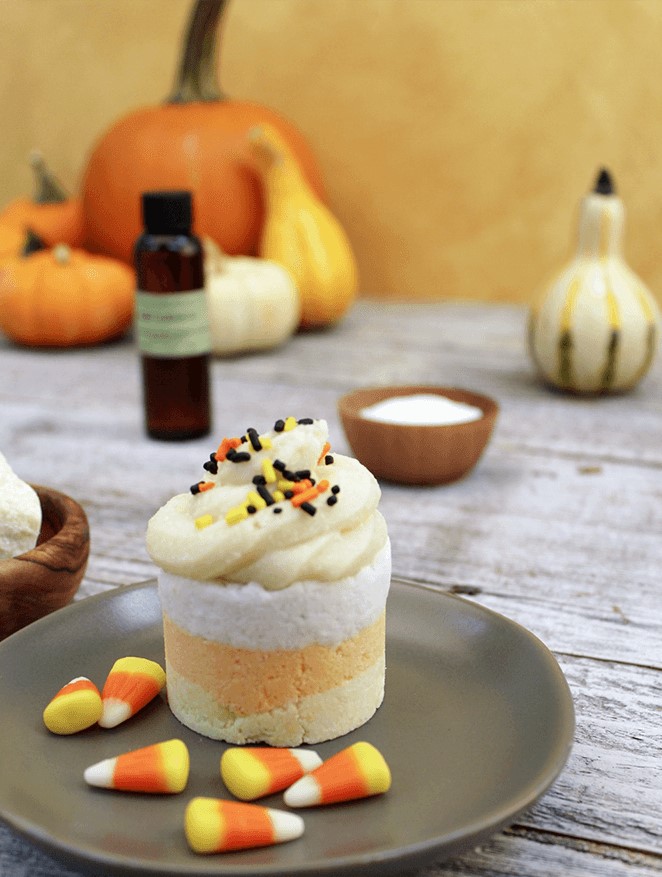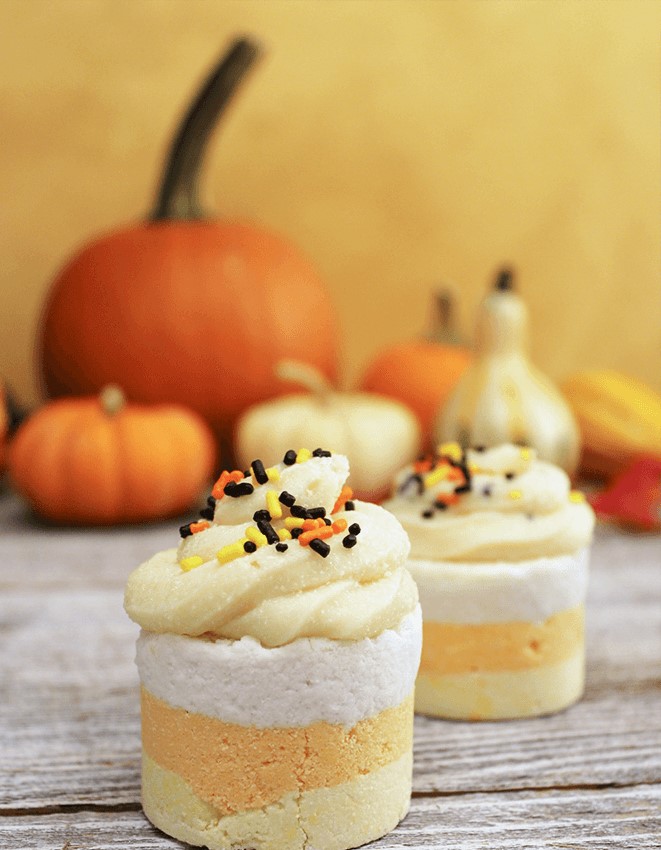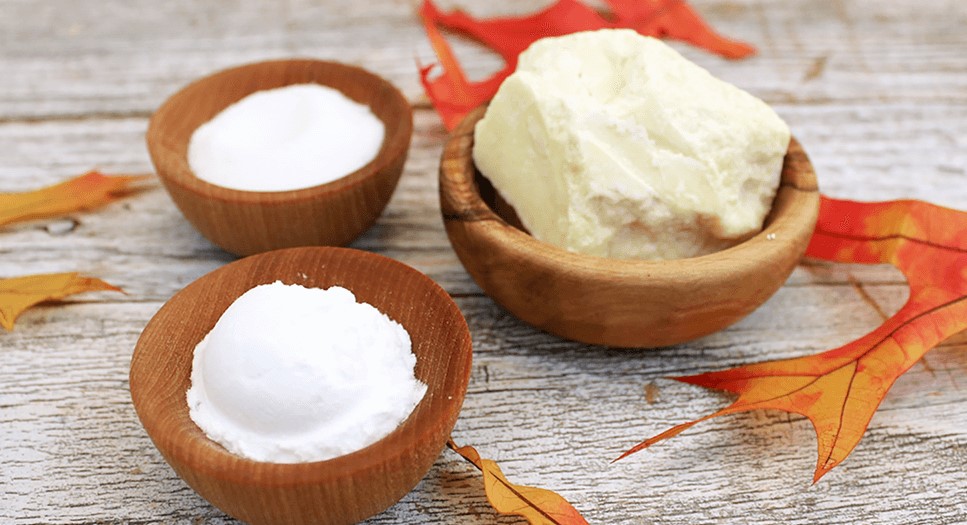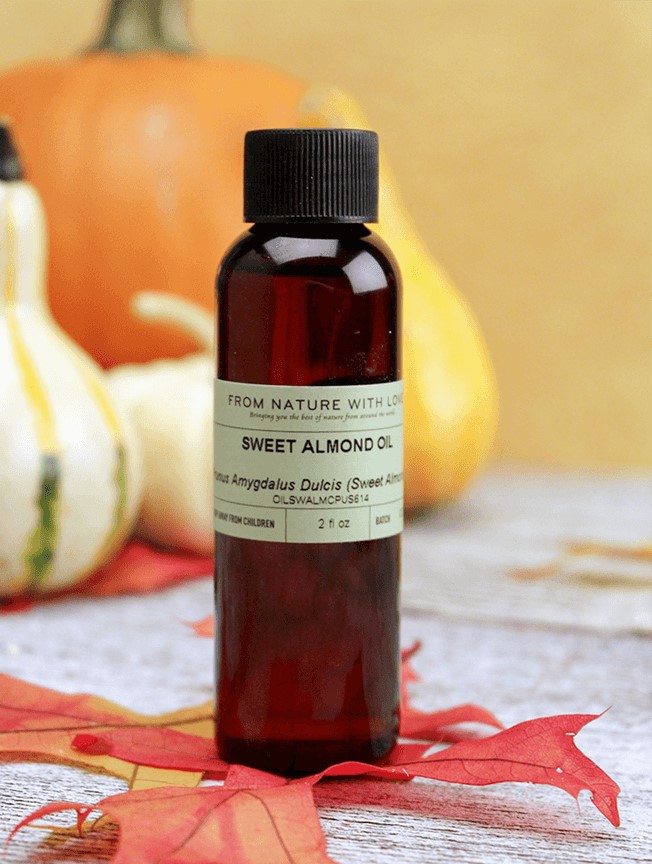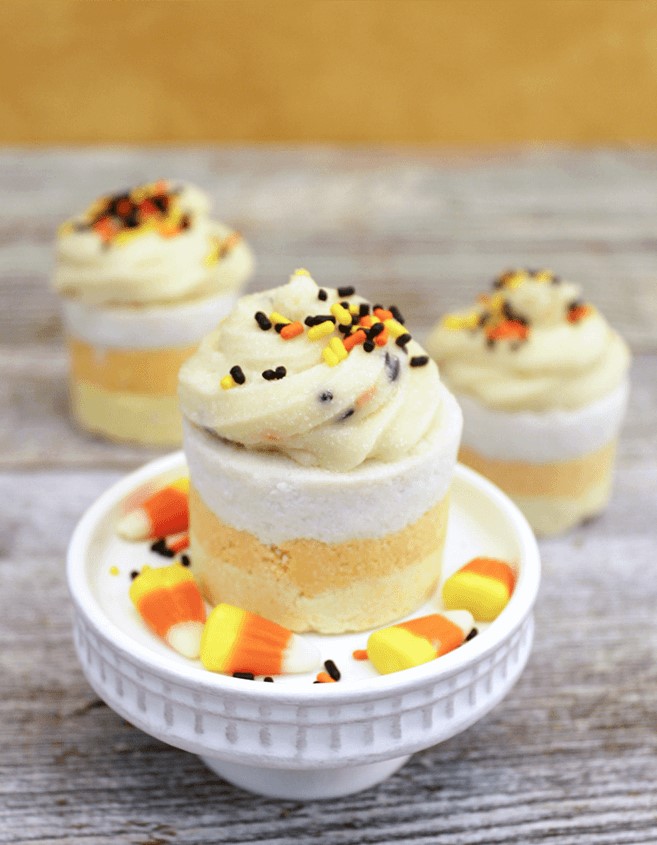
Can’t get enough of sugary sweets this autumn? No worries. This recipe has two sweet treats in one: a fizzy fragrance bath bomb and a butter bath melt topping! Candy Candy Corn Bath Bomb Parfaits are packed with moisturizing cocoa butter and sweet almond oil, and scented with fun colored layers of fizzing bath bomb powder.
Inspired by trick or treat candies, we used our traditional Vanilla Fragrance Oil to scent our Candy Corn Bath Bombs. If you like, you can substitute the fragrance oil for another that you prefer. If you’d prefer to use something natural, consider one of our Plant-Based Fragrance Oils. Our Vanilla Spice Plant-Based Fragrance Oil would be fantastic in this Candy Corn Bath Bomb recipe.
We used our Organic Cocoa Butter as a main ingredient in our Candy Corn Bath Bomb recipe. Our pure cocoa butter has a natural aroma reminiscent of delicious melted chocolate. The subtle scent will add a mild chocolate aroma to the finished product.
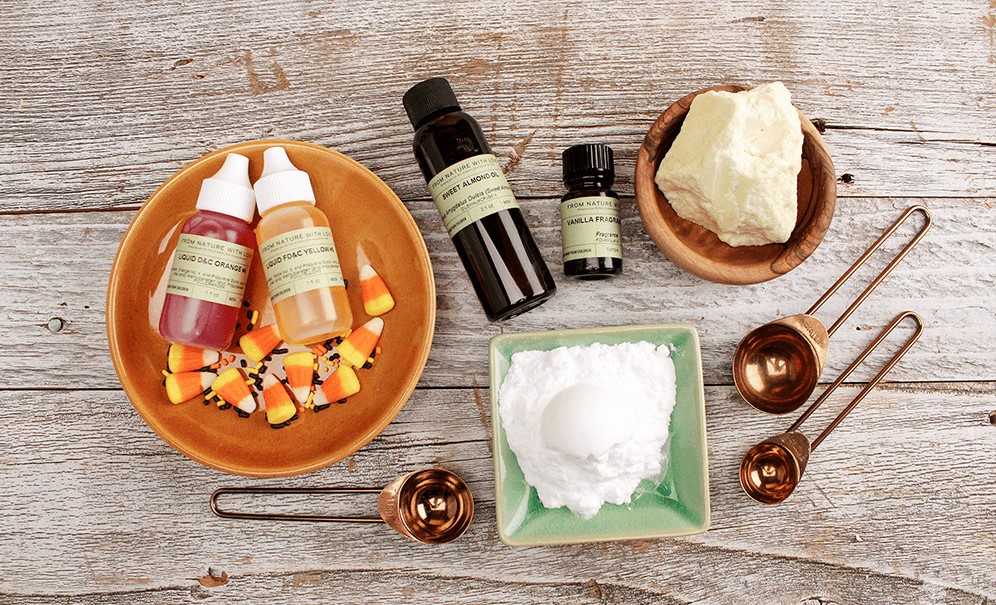
ABOUT THE INGREDIENTS
Baking Soda and Citric Acid
These two ingredients make up the base of most bath bomb and bath fizzy formulas. When used in a ratio of 2 parts baking soda to 1 part citric acid, the ingredients will react with water just the right way. Simple fizzles can be made using just these two ingredients with a small amount of water, but more advanced formulas can be bulked up with color, scent, clay, salt, carrier oils, butters, herbs, and more.
White Kaolin Clay
Also known as White Clay or China Clay, White Kaolin Clay is very gentle. This makes it suitable for all skin types. Even those with dry or sensitive skin types can enjoy products made with this mild, but deep cleansing ingredient. White Kaolin is often used as a base for facial masks. It can also be found in soaps, scrubs, and in bath bombs.
Sweet Almond Oil
Sweet Almond Oil is a classic ingredient for natural skin care products. It has a light, non-greasy texture that is easily absorbed by the skin. It can be used in everything from cold process soaps to lip balms, and is also a popular ingredient for lotions, creams, and aromatherapy formulations.
Cocoa Butter
The rich chocolate aroma of cocoa butter is immediately recognizable. This pure pressed butter is made from cacao, the main ingredient in chocolate. In addition to smelling delicious, cocoa butter is a superb moisturizing ingredient. It can be used to condition hair and skin when used alone or added to formulations such as lotions, soaps, or balms.
Witch Hazel 86%
Witch Hazel is a aqueous herbal extract that is prized for use in both folk remedies and natural skin care. The plant boasts natural anti-inflammatory benefits, gentle astringent properties, and has a knack for balancing the skin. Witch Hazel makes an excellent addition to body sprays, facial toners, emulsified creams and lotions, and a wetting agent for bath bombs.
CANDY CORN BATH BOMB PARFAITS
- 284 grams (10 ounces)Â Baking Soda
- 113 grams (4 ounces)Â Citric Acid
- 6 grams (.20 ounces)Â White Kaolin Clay
- 14 grams (.50 ounces)Â Sweet Almond Oil
- 14 grams (.50 ounces)Â Vanilla Fragrance Oil
- 14 grams (.50 ounces) Cocoa Butter (melted)
- 25 drops Liquid D&C Orange #4
- 25 drops Liquid FD&C Yellow #5
- Witch Hazel, as needed for spritzing
- 284 grams (10 ounces)Â Baking Soda
- 57 grams (2 ounces)Â Citric Acid
- 43 grams (1.5 ounces) Cocoa Butter, Deodorized (melted)
- 20 drops of Vanilla Fragrance Oil
- 14 grams (.50 ounces) Cream of Tartar
- Holiday Sprinkles (optional)
- Combine baking soda and kaolin clay in mixing bowl and stir well, breaking up any clumps.
- Melt cocoa butter and add to bowl followed by almond ​​oil and fragrance​ oil​. Mix very well.Â
- Separate mixture ​evenly ​into 3 bowls. Add 25 drops Orange #4 to first bowl and mix until evenly colored. Add 25 drops Yellow #5 to second bowl ​and mix until evenly colored. Leave third bowl white.
- Divide citric acid evenly into three parts and add one to each bowl. Mix well until the product is evenly moistened. The texture should be similar to wet sand and should clump together easily when pressed. If it’s still too dry, give a couple of spritzes of Witch Hazel to moisten further.
- Divide the yellow powder into three equal portions (about 35 grams or 1.25 ounces each). Press the powder into the bottom of the mold and press firmly to compress. Repeat with the remaining two colors.
- Gently remove bath bombs from molds and set aside.
- Combine baking soda and cream of tartar in bowl and mix well.
- Add fragrance oil and melted cocoa butter. Mix well. The mixture will start to feel sticky, similar to dough.
- Add citric acid and mix again to distribute evenly.
- Allow the mixture to cool, if necessary, until it is warm but still pliable. Put mixture into piping bag with frosting tip. (We used a Wilton 1M tip.)
- Pipe “frosting†onto bath bombs. Top with sprinkles.
- Allow bath bombs to cure and dry until they are rock hard (about 24 hours) before packaging.
- Bath bombs should be packaged in air-tight material in order to prevent them from being spoiled by moisture or humidity. Our Small Cello Bags are just right for this purpose.
- To use, simply drops a bath bomb into bath water and enjoy. The bath bomb will fizz, dissolve, and melt in a matter of minutes.
Shelf Life & Stability: Please note that the formulations featured here on The Natural Beauty Workshop have not been challenge tested for stability or shelf life, and may not be suitable for commercial use as-is. For more information on shelf life, stability, and working with preservatives, check out the following article from our Information Library.

